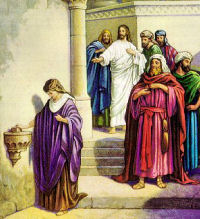“This poor widow put in more than all the other contributors.” (Mark 12:43)
Today’s readings give us two illustrations of extravagant love. First, we have the widow who cared for Elijah, and in the Gospel we see another widow, who put her last two coins in the Temple treasury.
Let’s face it—neither of these women had anything! So what possessed them to give so generously? There can be only one answer: love. With an almost reckless regard for their own lives, one shared her last bit of flour and oil, and one shared her last bit of money—and both did it out of love for the God they worshipped.
Whenever we witness courageous acts of love, our response should be the same reverence that Jesus had. When he saw the widow give her last two coins, he was so moved that he praised her to his apostles. “She, from her poverty, has contributed all she had, her whole livelihood,” he told them (Mark 12:44).
Blessed Mother Teresa understood this type of love, because she saw it every day on the streets of Calcutta. She once observed: “I have found the paradox, that if you love until it hurts, there can be no more hurt, only more love.” Like the widows in today’s readings, Mother Teresa encountered those who, despite having barely enough to live on, loved God and neighbor so deeply that they willingly shared the little they had with those who had even less.
What a high and beautiful goal these women have set for us! No matter where we are on the spectrum of earthly riches, we all have our own sense of what it means to give and to love until it hurts. Each of us can experience the great paradox that when we give of ourselves so deeply, we will encounter a love that will never be outdone in its generosity.
“Lord, I long for just a glimmer of the love that these widows had for you. Open my eyes to those who need your love, so that I can love them as extravagantly as you do.”
1 Kings 17:10-16; Psalm 146:7-10; Hebrews 9:24-28
Questions for Reflection or Group Discussion
1. In the First Reading, we meet a widow whose great faith in God allowed her to trust that what Elijah told her was true. “For the Lord, the God of Israel says, ‘The jar of flour shall not go empty, nor the jug of oil run dry until the day when the Lord sends rain upon the earth.’” Share a time when you were obedient to what you believed the Lord wanted you to do. What was the fruit of this obedience?
2. The Responsorial Psalm speaks of the Lord’s faithfulness to the most needy -- the oppressed, hungry, captives, blind, fatherless, widows, and those who are bowed down. What are some ways you can imitate the Lord by reaching out to others less fortunate than you?
3. The Second Reading speaks of Jesus’ first coming, and his sacrifice on the cross, and his second coming, when he will “bring salvation to those who eagerly await him.” Are you joyful and expectant when you think of the Jesus’ second coming? Why or why not? Should you be?
4. In the Gospel, Jesus contrasts the difference between the behavior of the scribes and that of the poor widow. Why do you think Jesus did this? How would you describe the difference? How does it apply to your own life?
5. In the meditation, these words of Blessed Mother Teresa are quoted: “I have found the paradox, that if you love until it hurts, there can be no more hurt, only more love.” What do these words mean to you? What steps can you take to live these words out more fully in your life?
6. Take some time now to pray and ask for the grace to know and experience more deeply God’s great love for you, and the grace to give it away to others. Use the prayer at the end of the meditation as the starting point.
